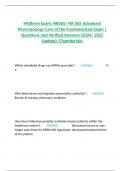Midterm Exam: NR565/ NR 565 Advanced
Pharmacology Care of the Fundamentals Exam |
Questions and Verified Answers (2024/ 2025
Update)- Chamberlain
Which scheduled drugs can APRNs prescribe? - ANSWER II-
V
Who determines and regulates prescriptive authority? - ANSWER
Boards of nursing, pharmacy, medicine
How does limited prescriptive authority impact patients within the
healthcare system? - ANSWER Decreased access to care,
longer wait times for APRN/MD signatures, decreased treatment time
of the patient
,Key responsibility of prescribing? - ANSWER
Documentation of discussion between prescriber and patient, did not
prescribe to friends and family, obtain thorough H&P, document
discussions regarding medication's, side effects, respecters, monitoring
and titrating
What should be used to make prescribing decisions? - ANSWER
Cost, availability, hepatic/renal monitoring, allergies, side effects,
interactions, guidelines, special populations
Pharmacokinetic/pharmacodynamic changes in older adults. -
ANSWER Things move slower in older adults. Absorption of
medication's in the G.I. tract decrease function of the liver decrease
function of the kidneys. Decrease lean muscle mass increase adipose
tissue.
, Beers Criteria for Potentially Inappropriate Medication Use in Older
Adults - ANSWER Potentially inappropriate medication
used in adults due to medication disease or medication syndrome
interactions that may exacerbate the disease or syndrome. Clinically
significant drug interactions that should be avoided in older adults
there's decrease may need to be incorporated it due to decreased
kidney function
Impacts - outcomes of polypharmacy - ANSWER
Simplifying drug regimen, providing clear and concise verbal and
written instructions, using an appropriate dosage form, clearly labeling
and dispensing easy to open containers, developing daily reminders,
monitoring frequently, affordability of drugs, support system.
CYP 450 inhibitors - ANSWER Inhibits the metabolism
activity of one or more of the CYP 450 enzymes VISA CKGQ valproate ,
Isoniazid, sulfonamides, amiodarone, Chloramphincol, ketoconazole,
grapefruit, quinidine. Can cause higher levels of toxicity in some meds




